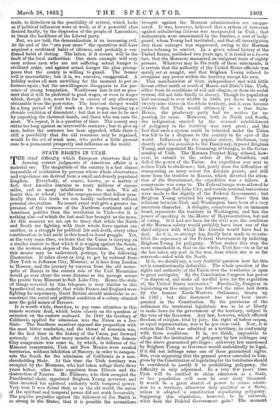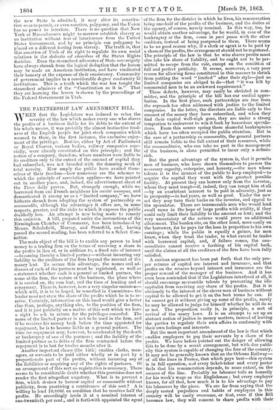STATE RIGHTS IN UTAH. T HE chief difficulty which European observers
find in forming correct judgments of American affairs is a material one. The magnitude of the country is a fact almost impossible of realization by persons whose whole observations and experience are derived from a small and densely populated kingdom. Everybody, of course, knows, as a matter of fact, that America contains BO many millions of square miles, and so many inhabitants to the mile. We all learnt this at school ; but the consequences that follow prac- tically from this truth we can hardly understand without personal observation. No recent event will give a greater im- pression of the vastness of the Northern continent and of American politics than the revolution in Utah—for it is nothing else—of which the last mail has brought us the news. At this moment we are apt to fancy that while the North and South are fighting with their whole force against one another, in a struggle for political life and death, every other consideration is laid aside in this hand-to-band grapple. Yet, at the very same time we learn that the Union is carrying on a similar contest to that which it is waging against the South, on the western slopes of the Rocky Mountains. Now, what this means may be understood, perhaps, by the following illustration. It takes about as long to get by railroad from New York to Jefferson City, Missouri, as it does from London to Moscow, and the journey by caravan from the old metro- polis of Russia to the eastern side of the Ural Mountains would go over about the same distance as the passage across the prairie from Missouri to Salt Lake City. Hence the state of things revealed by this telegram is very similar to this hypothetical one, namely, that while France and England were fighting for supremacy, Great Britain should undertake to re- construct the social and political condition of a colony situated near the gold mines of Berezov.
It is worth while, therefore, to pay some attention to this remote western feud, which bears closely on the question of secession on the eastern seaboard. In 1849 the territory of California applied for admission into the Union as a free :State. The Southern members opposed the proposition with the most bitter resolution, and the threat of secession was, for the first time in the history of the Union, put forward seriously. At last, after many months of debate, the famous Clay compromise was come to, by which, in defiance of the Missouri compromise, Utah and New Mexico were created territories, without inhibition of Slavery, in order to compen- sate the South for the admission of California as a non- slaveholding State. At this time the Utah territory was occupied by the Mormons, who had taken refuge there three years before, after their expulsion from Illinois and the destruction of Nauvoo. Mr. Fillmore, who then occupied the Presidential chair, appointed Brigham Young governor, and thus invested his spiritual authority with temporal power. Very soon it was found that, as in the old world, the union of the spiritual and temporal power did not work favourably. The popular prejudice against the followers of Joe Smith is so strong in the States, that it is possible the accusations brought against the Mormon administration are exagge- rated. It was, however, believed that a system of terrorism against unbelieving citizens was inaugurated in Utah ; that malcontents were assassinated by the Danites, a sort of body- guard, whom Young had instituted; and that all investigation into these outrages was suppressed, owing to the Mormon juries refusing to convict. In a grave school history of the United States, published two years ago, it is stated as a knoton fact, that the Mormons massacred an emigrant train of eighty persons. Whatever may be the truth of these statements, it is certain that the authority of the United States officials was openly set at naught, and that Brigham Young refused to recognize any power within the territory except his own.
This manifestation of State independence met with little favour either north or south of Mason and Dixie's line. Utah, either from its conditions of soil and climate, or from its social system, did not take kindly to slavery. Though its population had increased to over 40,000 in 1860, yet there were only twenty-nine slaves in the whole territory, and it soon became evident that Utah would ultimately be a free State. Hence, the proslavery party had no motive for es- pousing its cause. Moreover, both in North and South, the indignation created by the avowed establishment of polygamy in the territory was very great; and the fact that such a system could be tolerated under the Union was felt to be a disgrace to the country in the eyes of the world. Influenced by the popular outcry, Buchanan, very shortly after his accession to the Presidency, deposed Brigham Young, and appointed Mr. Cumming, of Georgia, to the Gover- norship of Utah. The Mormon Prophet King refused, how- ever, to submit to the orders of the President, and defied the power of the Union. An expedition was sent to reduce Utah to obedience ; but, partly from the difficulties of transporting an army across the desolate prairie, and still more from the troubles in Kansas, which diverted the atten- tion of the Government, the expedition was a failure. A compromise was come to. The Federal troops were allowed to march through Salt Lake City, and certain nominal concessions were made to the dignity of the Federal Government ; but Brigham Young retained his supremacy. Since then the relations between Utah and Washington have been of a very uncertain character. A delegate, conspicuous by an immense beard, represents the territory in Washington, and has the power of speaking in the House of Representatives, but not of voting. If it had not been for the civil war, the condition of the Mormon colony would probably have been one of the chief subjects with which Mr. Lincoln would have had to deal. As it is, an attempt has finally been made to re-esta- blish the supremacy of the Federal Government by indicting Brigham Young for polygamy. What makes this step the more remarkable is, that on the whole, Utah has—in as far as she has taken any part in the war, from which she is so far removed—sided with the North.
It is, we should say, a very doubtful question how far this act is constitutionally defensible. The whole question of the rights and authority of the Union over the territories is open to great ambiguity. By the Constitution Congress has power "to dispose of, and make all needful laws for the regulation of, the United States territories." Practically, Congress in legislating on this subject has followed the rules laid down by the famous North-Western Ordinance, drawn up in 1787 ; but this document has never been incor- porated in the Constitution. By the provisions of the ordinance the territorial legislature was to be at liberty to make laws for the government of the territory, subject to the veto of the Governor. Any law, however, which affected freedom of religion, trial by jury, the right of habeas corpus, or equal representation, was to be ipso facto void. Now, it is certain that Utah was admitted as a territory, in conformity with these conditions. it is, we think, impossible to allege that the institution of polygamy by law infringes any of the above guaranteed privileges ; and every law sanctioned by Brigham Young as Governor would undoubtedly be legal, if it did not infringe some one of these guaranteed rights. But, even supposing that the general power conceded to Con- gress by the Constitution of legislating for the territories should be considered to justify it in prohibiting polygamy, the difficulty is only adjourned. In a very few years' time Utah will be entitled to claim admission as a State, as her population will soon be over sixty thousand. It would be a great stretch of' power to refuse admis- sion to a territory, otherwise duly qualified as a State, unless it adopted a constitution repudiating polygamy. Supposing this stipulation, however, to be enforced, what does the Federal Government gain ? The moment
the new State is admitted, it may alter its constitu- tion so as to permit, or even sanction, polygamy, and the Union has no power to interfere. There is no question that New York or !if assachussets might to-morrow establish slavery as an institution without fear of interference from the United States Government, and by no principle can polygamy be placed on a different footing from slavery. The truth is, that this assertion of Utah of its right to regulate its own social relations is the deductio ad absurdum of the States Bights doctrine. Even the staunchest advocates of State sovereignty have always shrunk from the logical deduetion that the harem may be made an American institution, and have vindicated their honesty at the expense of their consistency. Community of government implies to a considerable degree conformity Of institutions. This is a truth which the war has taught the staunchest admirers of the "Constitution as it is." That they are learning the lesson is shown by the proceedings of the Federal Government in Utah.































 Previous page
Previous page